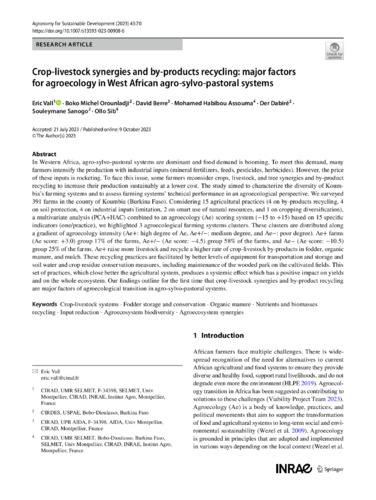Crop-livestock synergies and by-products recycling: major factors for agroecology in West African agro-sylvo-pastoral systems
Abstract In Western Africa, agro-sylvo-pastoral systems are dominant and food demand is booming. To meet this demand, many farmers intensify the production with industrial inputs (mineral fertilizers, feeds, pesticides, herbicides). However, the price of these inputs is rocketing. To face this issue, some farmers reconsider crops, livestock, and tree synergies and by-product recycling to increase their production sustainably at a lower cost. The study aimed to characterize the diversity of Koumbia’s farming systems and to assess farming systems’ technical performance in an agroecological perspective. We surveyed 391 farms in the county of Koumbia (Burkina Faso). Considering 15 agricultural practices (4 on by-products recycling, 4 on soil protection, 4 on industrial inputs limitation, 2 on smart use of natural resources, and 1 on cropping diversification), a multivariate analysis (PCA+HAC) combined to an agroecology (Ae) scoring system (−15 to +15) based on 15 specific indicators (one/practice), we highlighted 3 agroecological farming systems clusters. These clusters are distributed along a gradient of agroecology intensity (Ae+: high degree of Ae, Ae+/−: medium degree, and Ae−: poor degree). Ae+ farms (Ae score: +3.0) group 17% of the farms, Ae+/− (Ae score: −4.5) group 58% of the farms, and Ae− (Ae score: −10.5) group 25% of the farms. Ae+ raise more livestock and recycle a higher rate of crop-livestock by-products in fodder, organic manure, and mulch. These recycling practices are facilitated by better levels of equipment for transportation and storage and soil water and crop residue conservation measures, including maintenance of the wooded park on the cultivated fields. This set of practices, which close better the agricultural system, produces a systemic effect which has a positive impact on yields and on the whole ecosystem. Our findings outline for the first time that crop-livestock synergies and by-product recycling are major factors of agroecological transition in agro-sylvo-pastoral systems.

